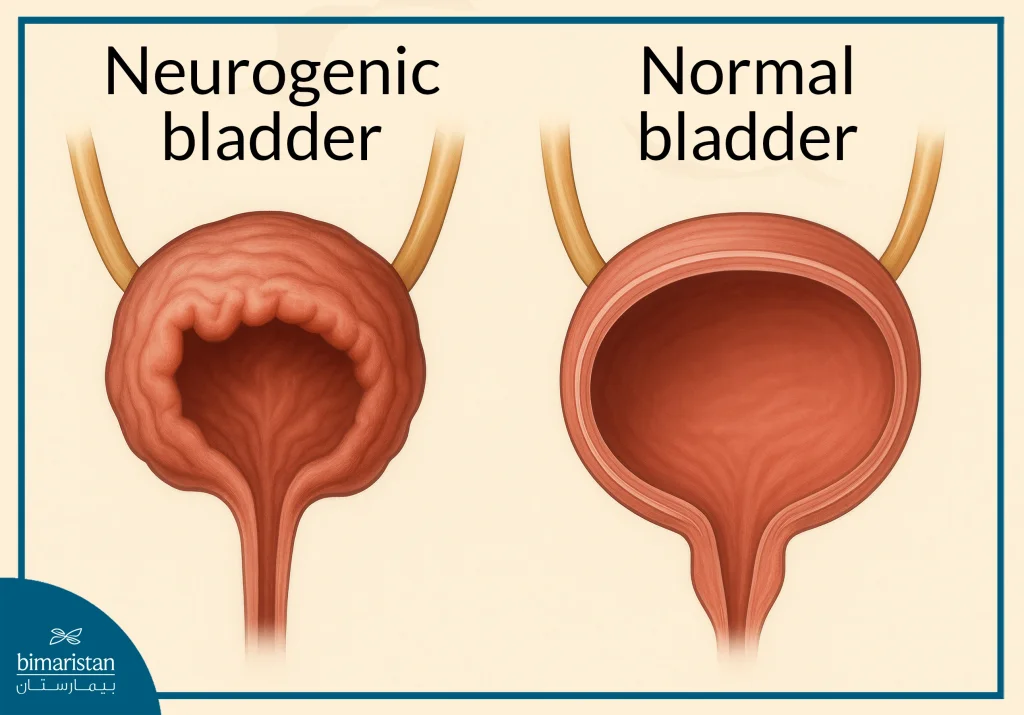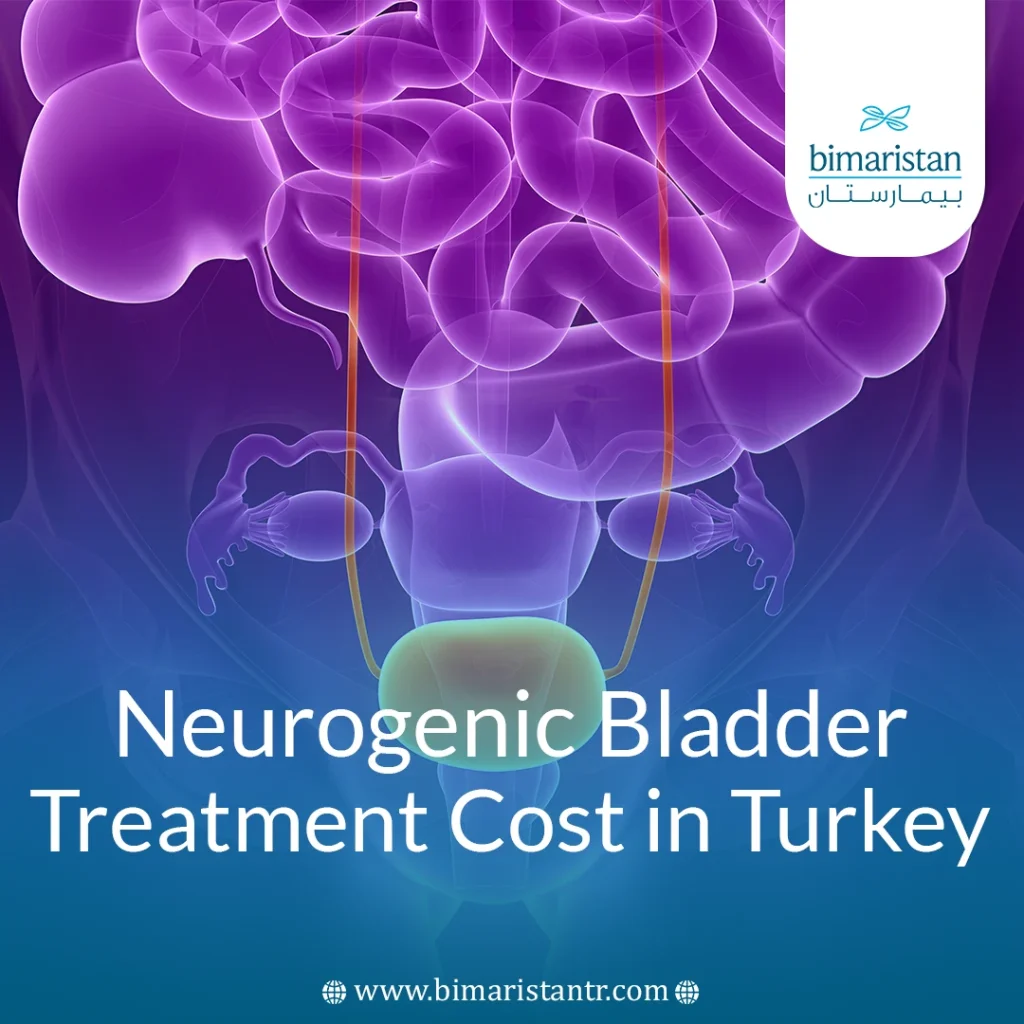If you suffer from neurogenic bladder issues that affect your daily life and marital relationship, treating it using modern techniques in Turkey is the perfect solution for you. Thanks to advanced developments in this field, leading medical centers like Bimaristan offer effective and safe solutions at competitive neurogenic bladder treatment cost in Turkey. In this article, we review the neurogenic bladder treatment cost in Turkey for 2025, explaining the prices of the latest procedures and modern techniques to help you make the right decision towards an effective and safe treatment.
What is a neurogenic bladder, and when does it need surgical treatment?
Neurogenic bladder, also known as neurogenic lower urinary tract disorder, is a condition that occurs when a person loses bladder control due to issues in the brain, spinal cord, or nerves. Several muscles and nerves must work together to keep urine in the bladder and ready to be emptied. Nerve messages travel between the brain and the muscles that control bladder emptying. If these nerves are damaged by disease or injury, the muscles may not be able to contract or relax at the right time. In people with neurogenic bladder, the nerves and muscles don’t work well together, resulting in the bladder not filling and emptying properly.

A neurogenic bladder can be a birth defect that is present from birth and is often caused by:
- Lumbar regression syndrome
- Cerebral palsy
- Spina bifida (vertical split in the spine)
Common neurological conditions that may cause neurogenic bladder include:
- CNS tumors.
- Diabetes mellitus.
- Multiple Sclerosis (MS).
- Parkinson’s disease.
- Stroke.
- Spinal cord injuries.
- Injuries resulting from falls or accidents, such as car accidents.
Conditions that require surgical treatment after drug therapy and physical therapy have failed include:
- When the sphincter muscles don’t work properly.
- When the bladder is insufficiently sized to store urine due to nerve damage.
- When drug therapy does not respond to treat urinary incontinence or excessive urination.
- When drug therapy doesn’t respond to severe urinary retention, where the bladder doesn’t empty completely.
The latest technology for neurogenic bladder treatment in Turkey
Neural stimulation of the bladder
It is a technique that uses an implanted device where the surgeon places a thin wire in the upper part of the buttocks. The wire is connected to a neurostimulation device worn on a belt under clothing. To send mild electrical impulses to stimulate the nerves that control the bladder, these nerves help manage when and how you urinate by modulating signals from the brain and spinal cord to the bladder:
- To reduce the number of times you urinate.
- Prevent urine leakage.
The implant procedure takes 40 to 60 minutes under local anesthesia for the skin of the surgical area only, and results showed that 67% of patients with urinary incontinence or overactive bladder experienced a significant improvement in symptoms after sacral nerve stimulation.
Botox injections in the bladder
This procedure is done by injecting small doses of botulinum toxin type A, also known as Botox, into the bladder tissue. This procedure relaxes the bladder muscles and increases the amount of urine the bladder can hold by blocking the nerve signals that cause the bladder muscles to contract and relax the bladder muscles.
- Acute urge incontinence.
- When there is a need to increase bladder capacity.
The effects of the injections often last for six months or longer. When the effects wear off, the injections will be repeated.
Surgical bladder dilation
It is a surgical procedure that aims to enlarge the bladder so that it can hold more urine by using part of the small intestine or large intestine to replace part of the bladder. A catheter is often used to empty the bladder, and the procedure is used to reduce bladder pressure and enlarge the bladder enough to hold urine (without leaking) for at least four hours between catheterizations.
Bladder dilation is performed in the following steps:
- An incision in the abdomen (traditional surgery) or several small incisions (robotic surgery).
- Making an opening at the top of the bladder.
- Removing part of the small or large intestine.
- Open this part of the intestine.
- Attach it to the top of the bladder.
- Sewing the bladder and bowel together to enlarge the bladder.
Surgical intervention to dilate the bladder usually takes two to six hours.
The success rate of the procedure is around 85-90%.
Potential risks of bladder enlargement surgery
Risks of not washing the bladder regularly include:
- Clogged catheters affect the flow of urine.
- This can cause the bladder to stretch or even rupture.
- Urinary tract infections or bladder stones.
Risks associated with surgery
- The dangers of anesthesia.
- Problems with healing.
- Infection.
- Formation of a blood clot (hematoma).
- swelling.
- bruises.
- Unwanted scars.
- Hernia formation.
Neurogenic bladder treatment cost in Turkey 2025
The neurogenic bladder treatment cost in Turkey varies according to the technique used, and the following table shows the prices:
| Type of technique | Approximate Price (USD) | Notes |
|---|---|---|
| Neural stimulation of the bladder | 7500 – 9500 | Tests and follow-ups include |
| Botox injections in the bladder | 800 – 1200 | For one session |
| Surgical bladder dilation | 5500 – 7000 | Varies depending on the situation |
These prices may vary depending on several factors such as where the procedure is performed, the experience of the surgeon, and the hospital where the treatment is performed.
Why choose neurogenic bladder treatment in Turkey?
- The latest technology is available at competitive prices: The neurogenic bladder treatment cost in Turkey is low compared to European countries, making it a favorite destination for many patients.
- Quality of healthcare: Turkey has a well-developed health system with hospitals equipped with the latest medical technology and highly experienced doctors.
- Hospitals equipped with advanced neurostimulation systems: Medical centers in Turkey, such as Bimarestan, use modern techniques in artificial bladder treatment as they are equipped with the latest neurostimulation systems for the bladder, which ensures effective and accurate results and faster recovery time.
- Ease of access: Turkey is strategically located, making it easily accessible from various countries of the world, in addition to the presence of direct flight services.
- Post-operative follow-up and rehabilitation programs: Medical centers in Turkey provide comprehensive care that includes pre- and post-operative consultations, ensuring patients’ comfort and support during the recovery period to ensure the patient’s full recovery and avoid complications.
- Turkish doctors’ expertise in urological surgery: Turkish doctors specialize in urological surgeries and have international training and experience in treating complex issues such as neurogenic bladder.
Tips before making a treatment decision
- Consult a specialized doctor and provide radiology and analysis reports: A urologist who specializes in treating neurogenic bladder or urinary incontinence should be consulted to fully assess the condition by studying the medical history and symptoms. Imaging and analysis reports should be submitted to determine the exact cause of the issue and rule out any other health conditions that may be affecting the bladder.
- Compare the available treatments to choose the most appropriate one: It is important to know all available treatments, whether pharmaceutical or surgical, and know the benefits and risks of each option to determine the most appropriate treatment according to the patient’s health condition.
- Know the required length of stay after the operation: The length of stay after the procedure varies depending on the type of treatment and the patient’s health condition.
The neurogenic bladder treatment cost in Turkey is very favorable compared to other countries, while providing high-quality medical services. This makes Turkey a favorite choice for patients looking for effective and affordable treatment, enhancing its position in medical tourism and providing excellent opportunities for treatment at lower costs.
Sources:
- National Institute of Diabetes and Digestive and Kidney Diseases. (2019). Neurogenic bladder. National Institutes of Health.
- MedlinePlus. (2020). Bladder problems. U.S. National Library of Medicine.
